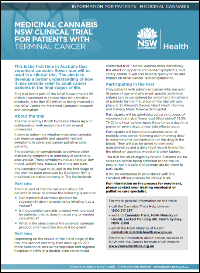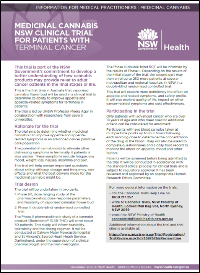Palliative care
The goal of this program of work is to assess whether cannabis medicines can enhance the quality of life for adults with advanced cancer, particularly by improving appetite and appetite-related symptoms. The program consists of two stages and will play a critical role in helping to answer important questions about safety, efficacy, dosage and frequency, side effects, and what the best delivery mode might be for people with palliative care needs. This trial is led by UNSW and Professor Meera Agar in collaboration with researchers from several universities and clinical centres.
It is separate to the Medicinal Cannabis Compassionate Use Scheme which is administered by the NSW Department of Communities and Justice.
Stage 1 (Phase I/II) trial
Stage 1 of this trial is now complete and is no longer enrolling new participants.
The first stage of the trial aimed to enrol up to 30 participants with advanced cancer and took place at Sacred Heart Health Service, St Vincent’s Hospital, Sydney.
A cannabis flower bud produced by Bedrocan BV®, a medicinal cannabis company in the Netherlands, was used in Stage 1. This is the first time in Australia that a vaporised cannabis flower bud has been used in a clinical trial to develop a better understanding of how it may provide relief to adult cancer patients in the final stages of life.
Participants were administered increasing doses of the vaporised cannabis flower bud (Bedrobinol® approximately 13.5% delta-9-tetrahydrocannabinol(THC)) one hour before meals three times a day for a period of seven days,unless side effects occurred. Participants had blood samples taken at multiple time points up to four hours following each morning dose to determine the concentration of the drug in the blood. They were also asked to complete questionnaires and a daily food record to monitor the effect on appetite, mood and other factors. The study findings are being finalised for publication.
Stage 2 (Phase IIb) trial
Stage 2 is currently recruiting participants.
The second stage of the program uses an oral tablet of delta-9-tetrahydrocannabinol (called Namisol®) produced by Echo Pharmaceuticals B.V., a medicinal cannabis company in The Netherlands. Stage 2 aims to determine if oral delta-9-tetrahydrocannabinol (THC) can improve anorexia-related symptoms and concerns in people with advanced cancer compared to placebo in a double-blind randomised clinical trial. This stage is occurring across multiple sites across metropolitan and regional NSW and may enrol up to 250 participants.
Participants will commence on a single dose before dinner, increasing slowly over the course of one week to a maximum of 4.5 mg THC three times a day before meals.
The outcomes of interest are appetite-related symptoms and concerns, including altered taste and smell sensations, quality of life, relief of other symptoms and side effects. Appetite is particularly important in end-of-life situations as food is a central part of any social gathering. These events can be challenging for people in palliative care if they have developed an aversion to food and its smell.
If the participant is still responding to the study treatment at the end of the study (Namisol® arm) or had no response (placebo arm), there may be an opportunity to continue with treatment post study through current mechanisms for access to cannabis medicines. Ongoing treatment will consider the benefits and harms experienced in the trial.
Participating in the palliative care trial
Only participants with advanced cancer who are 18 years and older and who meet specific additional criteria can be considered for enrolment. Participants can be enrolled at several metropolitan and regional locations.
Participants will gradually increase their frequency of Namisol® and maintain the dosing for at least one week after the maximum tolerated dose is reached.
Participants will have blood and urine samples taken at the initial screening to check if it is safe to participate in this trial. They will also be asked to complete questionnaires and a daily food record to monitor the effect on appetite, mood and quality of life.
The trial has strict eligibility criteria. Participants will be screened before being admitted to the trial to ensure that it is safe and appropriate for them to participate.
As a clinical trial this study has approval through a Human Research Ethics Committee and will be conducted in accordance with the standard ethical process for clinical trials.
For information on the process for enrolment, please contact your treating oncologist or palliative care specialist.
Further information about the trial for patients and health professionals can be found in the factsheets below.


